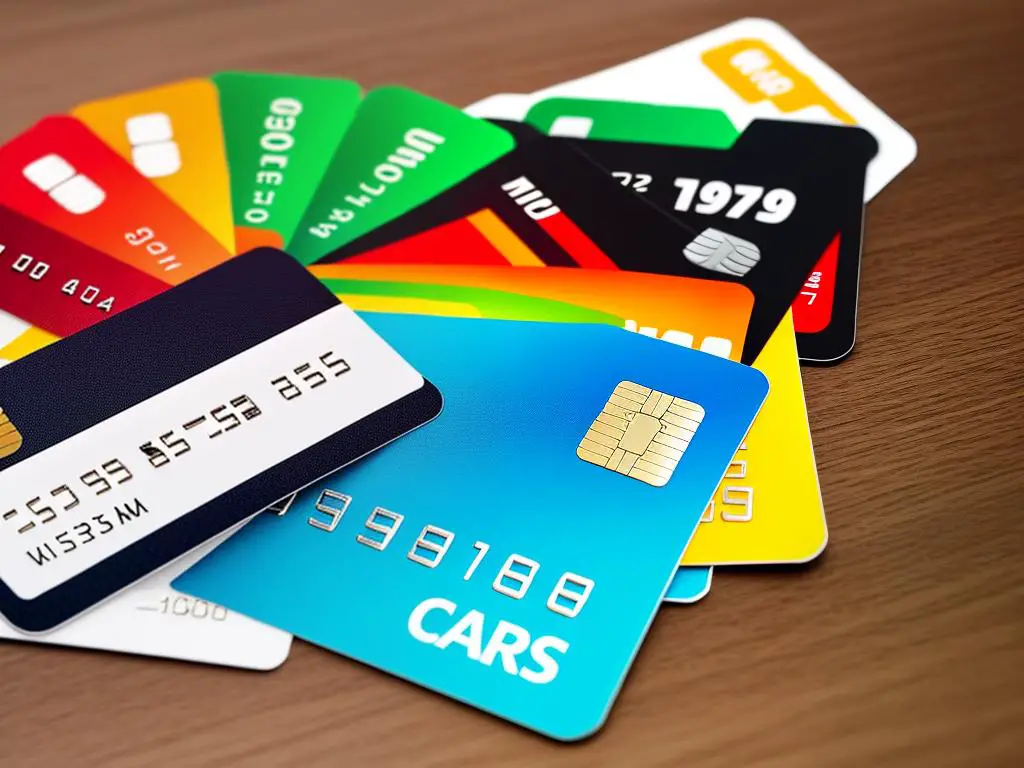In today’s ever-burgeoning digital era, cash rewards credit cards have become a prevalent way for consumers to gain a little extra from their regular spending. These cards function by offering rewards on specific types of purchases or on spending that reaches a particular threshold within a stipulated time frame. But to reap the maximum benefits from these cards, one needs to have a sound understanding of these complex systems.
My guide is designed to help the general public understand the workings of cash rewards credit cards, how to qualify for these rewards, compare different cards for maximum cash benefit, and finally, be aware of the tax implications. Cash rewards credit cards are strategies to earn fast cash by shopping. Basic to advanced, each aspect is covered to provide you with a comprehensive view.
Understanding How Cash Rewards Credit Cards Work
Understanding Cash Rewards Credit Cards: The Basics
Cash rewards credit cards are financial tools that work on a simple principle – the more you spend, the more you earn back in cash rewards. They are essentially loyalty programs that reward spending with cash instead of points or miles. The cash back you earn is typically a percentage of your purchases.
Every time you use a cash rewards credit card for eligible purchases (such as groceries, gasoline, dining, or travel) the credit card issuer will give you a certain percentage of that amount back in the form of cash rewards. The cash back rate can range anywhere from 1% to 5% of your purchases, depending on the card and the specific purchases you make.
Since these cards offer a straightforward way to earn rewards, their popularity has soared. However, the ins and outs of how these cards work, the types of rewards they offer, and key terms associated with them, are essential to understand before opting for them.
Types of Cash Rewards Credit Cards
- Flat-rate cash back cards: These offer the same cash-back percentage on all purchases.
- Tiered cash back cards: Certain categories of purchases earn more cash back than others. For instance, you could earn more on supermarket spending than on other purchases.
- Rotating category cards: These cards offer a high cash back percentage in certain spending categories that change every quarter.
- Selective category cards: These cards offer a high cash back rate for spending in specific categories of your choice.
Key Terminology Associated with Cash Rewards Credit Cards
- Cash back rate: This refers to the percentage of your purchases that is returned to you as a cash reward.
- Reward caps: Some cards may cap the amount of cash back you can earn during a specific period.
- Redemption options: Various cards offer different methods to redeem your cash rewards, like a statement credit, a check, a gift card, or even using the rewards for purchases.
- Sign-up bonuses: Many cards offer an additional cash reward to new cardholders if they spend a certain amount within the first few months.
Understanding Credit Card Rewards Systems
Credit card companies employ cash back rewards systems as an approach to encourage cardholders to use their services more frequently. Thus, the more frequently a cardholder uses their card, the higher the transaction fees the issuer collects from merchants, offering a financial boost for the issuing company. Furthermore, reward cards are typically paired with higher interest rates compared to non-reward cards, constituting yet another income stream for these companies.
For the cardholders, these rewards could produce substantial savings on their everyday expenses and may offset any annual fees or high interest costs. No matter how they’re redeemed, these cash rewards offer cardholders a degree of flexibility and potential financial relief.

Requirements for Earning Cash Rewards
Eligibility Requirements for Cash Rewards Credit Cards
To start earning cash rewards with your credit card, it’s vital to apply for a specific card that features this benefit. Major players in the credit card industry, including Visa, Mastercard, and American Express, all offer versions of cash rewards cards, though their terms and conditions can differ.
It’s important to remember that your eligibility largely depends on several factors such as your credit history, credit score, employment status, and annual income. Maintaining a good credit score, ideally above 700, is typically seen as favorable in this process.
Types of Purchases Qualifying for Cash Rewards
Cash rewards are generally earned through making eligible purchases via the credit card. Various credit cards have different requirements relating to the type of purchases that qualify for rewards. For instance, some cards reward more for spending on groceries and at supermarkets, while others may benefit those who spend more on travel, dining, or gas. Some cards offer a flat rate on all purchases while others follow a tier-based rewards system.
Quest for Achieving a Specified Spending Level
Some cash rewards credit cards also set a specified spending level to unlock the rewards. For example, a card may offer a $200 cash back reward if you spend $1000 within the first three months of account opening. These types of offers are typically found in credit cards marketed to consumers who are likely to make larger purchases, or who can shift their spending from other cards to the new one in order to meet the spending requirement.
Understanding the Cash Back Percentages
Typically, cash rewards cards offer a percentage of cash back on the amount you spend using them, and the percentage can range from 1% to as high as 5% based on the type of purchase. Flat-rate cards offer the same percentage back on all purchases, regardless of the category, while category-specific cards offer different percentages based on the nature of the purchase. Rotating category cards also exist, offering high percentages in changing categories each quarter.
Consider the Annual Fee
Many cash rewards credit cards come with an annual fee that can eat into your earnings if you’re not earning enough rewards to offset the cost. While some cards waive the fee for the first year or don’t charge any fee at all, other cards may charge an annual fee ranging from $25 to even $500. Therefore, it is essential to consider whether the rewards you earn will surpass the fees before opting for a cash rewards credit card.
Regularly Review Your Spending Habits
Your spending habits play a crucial role in how effectively you can earn cash rewards. Regularly reviewing your spending can help you identify the categories where you spend most, allowing you to choose a card that gives the maximum cash back on those categories. If your spending habits are spread across multiple categories, a flat-rate card might be more beneficial.
Read the Fine Print
Last, understanding the terms and conditions is a crucial part of maximizing your cash rewards earning potential. Be sure to familiarize yourself with any limitations or exclusions, like a maximum limit on cash rewards per quarter, expiration dates, or redemption methods. Some cards may also offer promotional periods with higher reward rates, which could boost your earning potential if appropriately used.
Strategize Your Cash Reward Redemption
Before you begin building up your cash rewards, it’s crucial to have a clear strategy for how you’ll eventually redeem them. These rewards, which can typically be redeemed as statement credits, checks, or gift cards, fluctuate in value based on the redemption method you choose.
Make sure to thoroughly assess how much your rewards are worth before deciding how to redeem them. For instance, keep in mind that some cards value your rewards less if you redeem them in exchange for goods or services, rather than as cash or a statement credit.

Comparing Credit Cards for Maximum Cash Rewards
Getting to Know Cash Rewards Credit Cards
It’s essential to understand what cash rewards credit cards are to maximize their benefits fully. These types of credit cards reward you with a specific amount of cash back, ranging from 1% to 5% of your total spending. The rewards can then be redeemed in various ways, including checks, statement credits, or direct application towards certain purchases. Some cards also entail additional bonuses when you shop at specific retailers or certain categories such as groceries, gas stations, or restaurants.
Comparison and Selection of Cash Rewards Credit Cards
When comparing cash rewards credit cards, the first thing to consider is the type of spending for which you will primarily use the card. If you spend a lot on gas and groceries, consider cards that offer higher rewards for those categories. If you maintain a balance on your credit card, then a cash rewards card with lower interest rates could be a more beneficial option. It would also be ideal to look for a card with no annual fee, unless the benefits outweigh the annual fee cost.
Understanding Reward Rate Structures
Credit cards may offer tiered, rotating, or flat rate rewards.
- Tiered cards offer different rates for specific categories. For instance, a card might offer 3% back on dining, 2% back on gas, and 1% on all other purchases.
- Rotating rewards cards offer high cash back percentages (often 5%) for specific categories that change quarterly and might require quarterly activation. All other purchases typically earn 1% cash back.
- Flat-rate cards offer the simplicity of a single rate (usually between 1.5% and 2%) on all purchases.
Potential Pitfalls
It’s important to be aware of the restrictions and limitations often linked with cash rewards credit cards. For example, many cards have a limit on how much cash back you can earn within a certain period. Also, some cards may require you to reach a specific amount before you can redeem your rewards. Cash back benefits could also be forfeited, should you fail to make a payment on time. Therefore, always ensure to read the card agreement to understand your card’s terms.
Maximizing Cash Rewards
To earn the most rewards, developers a strategy based on your spending habits. If you have multiple cards, be sure each one fits a spend category that aligns with your lifestyle. Pay off your balance in full every month to avoid losing your earnings to interest payments. Additionally, take advantage of bonus offers, and regularly check for changes in reward categories on rotating or tiered cards.
Finding the Ideal Cash Rewards Credit Card for Your Lifestyle
Naturally, what is effective for one person may not hold true for another. The ideal cash rewards credit card for you largely hinges on your individual values—whether those include lofty reward rates, attractive bonus offerings, or reward flexibility. Consider your own spending tendencies closely while choosing a card that gracefully syncs with your lifestyle’s unique qualities. Luckily, there are countless online resources and tools at your disposal to aid you in comparing and opting for the ultimate cash rewards credit card that perfectly conforms to your personal preferences.

Strategies for Earning More Cash Rewards
Deciphering the Mechanics of Cash Rewards Credit Cards
Cash rewards credit cards reward you by returning a percentage of your spending back to you. The average rates usually range between 1% and 2% on overall purchases. Interestingly, some cards tip the equation in your favor by doling out even higher rewards on specific categories such as groceries, gas, dining, or travel. If you adeptly match your card to your everyday spending habits, you stand to maximize your cash rewards considerably.
Optimizing Your Spending
To make the most out of your cash rewards credit card, determine what your biggest expenses are and look for a card that offers high rewards for those specific categories. If your biggest expenditures are on groceries and gas, you would do well with a card that offers high rewards for those categories. Often, these can earn you up to 4-5% back on purchases, significantly higher than the standard 1-2%.
Dos and Don’ts of Cash Rewards Credit Cards
DO pay your balance in full each month: To get the most benefit from your cash rewards card, you need to avoid paying interest. It’s not worth earning 2% cash back if you’re paying 18% in interest. Therefore, it’s crucial you pay your credit card balance in full each month.
DON’T spend more than you can afford to pay off: Credit cards with cash rewards can sometimes lead to overspending as people try to earn more rewards. This strategy can backfire, leaving you with a sizable debt. Remember, you should only indulge in purchases that you can afford to pay off by the end of the billing cycle.
DO take advantage of sign-up bonuses: Many cash reward credit cards offer significant bonuses for signing up and spending a certain amount within the first few months. If you can meet these criteria without going out of your planned budget, these bonuses can be a lucrative way to earn extra cashback.
Common Mistakes to Avoid
Don’t forget about your redemption: Cash back is not usually automatic. You typically have to request your cash back when you’re ready to redeem it. If you forget, you’re leaving cash on the table.
Don’t let your cash back expire: Some credit cards have rewards that expire if not redeemed. Make sure you know the terms of your card and plan to redeem your rewards before they expire.
Don’t ignore annual fees: Some cash back cards come with high annual fees that can quickly eat up your rewards. Always calculate whether your annual earnings from the card would outweigh the fees.
Finding the Best Cash Rewards Credit Card
When it comes to selecting a suitable cash rewards credit card, it’s not just about the cash back percentage. It’s necessary to also look at the specific categories that each card favors.
Furthermore, you should familiarize yourself with the fine print, especially about the redemption process and potential expiry of the rewards. If used correctly and matched well with your expenditure patterns, you can maximize the advantages of a cash rewards credit card and earn extra cash.

Tax Implications of Cash Rewards
Tax Implications of Cash Back Rewards from Credit Cards
While cash rewards are quick methods to boost your earnings, there are tax considerations. Earning cash back through your credit card is an appealing proposition that many banks and credit card companies put forward to attract clients.
The silver lining is that the IRS usually views cash rewards from credit cards as discounts rather than as income. This stems from the current policies in tax laws which classify them as price deductions of purchased goods, not revenue. As such, because discounts reduce the price of a product instead of serving as a gain or profit, they remain exempt from income tax.
Recent IRS Regulations on Credit Card Rewards
The IRS has issued guidance acknowledging that the general principle is that rewards and points that are received from credit cards are not taxable income. These benefits are typically viewed as a return of expenditures rather than an income. Therefore, they are not subjected to federal income tax reporting.
Additionally, a tax court case, Shankar and Tringali vs. Commissioner (T.C. Summ. Op. 2014-45), cemented the idea that rewards that are tied to purchases (like cash back, miles earned per dollar spent) are indeed rebates, and not income. Therefore, these are not subject to taxation.
Exceptions to the Rule
Despite the general rule, however, there are exceptions. One such scenario that the IRS discussed in a 2002 announcement was in regard to a promotional benefits situation. In this specific case, the credit card company offered a $50 award to new customers who opened up an account regardless of whether they made any purchases or not. In this case, the IRS ruled that the $50 was taxable, as it was an inducement to do business rather than a rebate or discount.
Another potential exception could be if your credit card issuer rewarded you for referring new customers to open an account, or you earned a bonus for meeting certain spending thresholds. Depending on the specifics of the situation, these could be considered taxable income.
Monitoring IRS Guidance for Updates
While the current IRS guidance is that credit card rewards are not taxable, it is always important to monitor for possible updates or changes that could affect your tax situation. Be aware of any significant changes in how you obtain your credit card rewards and consult with a tax professional if you’re unsure about the potential tax implications.
Remember, the information given here provides a general understanding, and the taxation of credit card rewards can be influenced by the specifics of your financial situation and potential changes within the IRS regulations. The responsibility lies on you as the tax-payer to declare anything that could potentially be considered taxable income.

Armed with the knowledge from this guide, consumers can now maneuver through the landscape of cash rewards credit cards confidently. Remember, it pays to understand your spending habits, be mindful of potential pitfalls, and stay on top of ever-changing credit card offers.
Understanding these nuances can help you generate notable cash rewards that could make a considerable difference in your annual financial balance. And while cash rewards seem free, some might have tax implications. Make sure to stay updated with IRS regulations to avoid any unpleasant surprises during tax season. Keep these points in mind, use your cards smartly, and your wallet could thank you at the end of the year.



